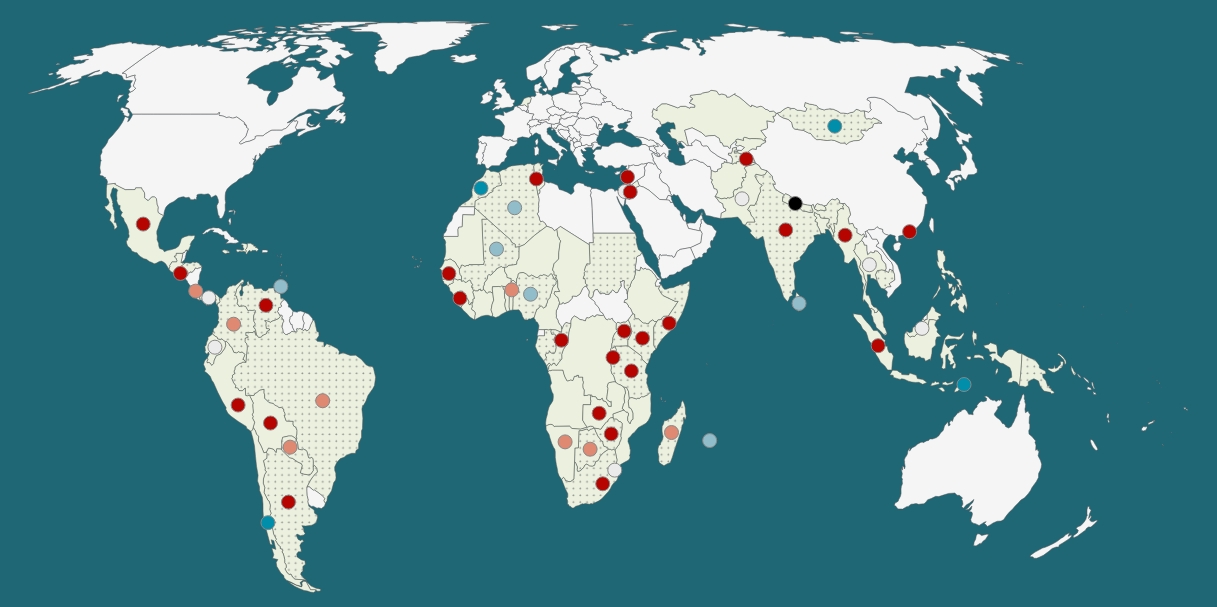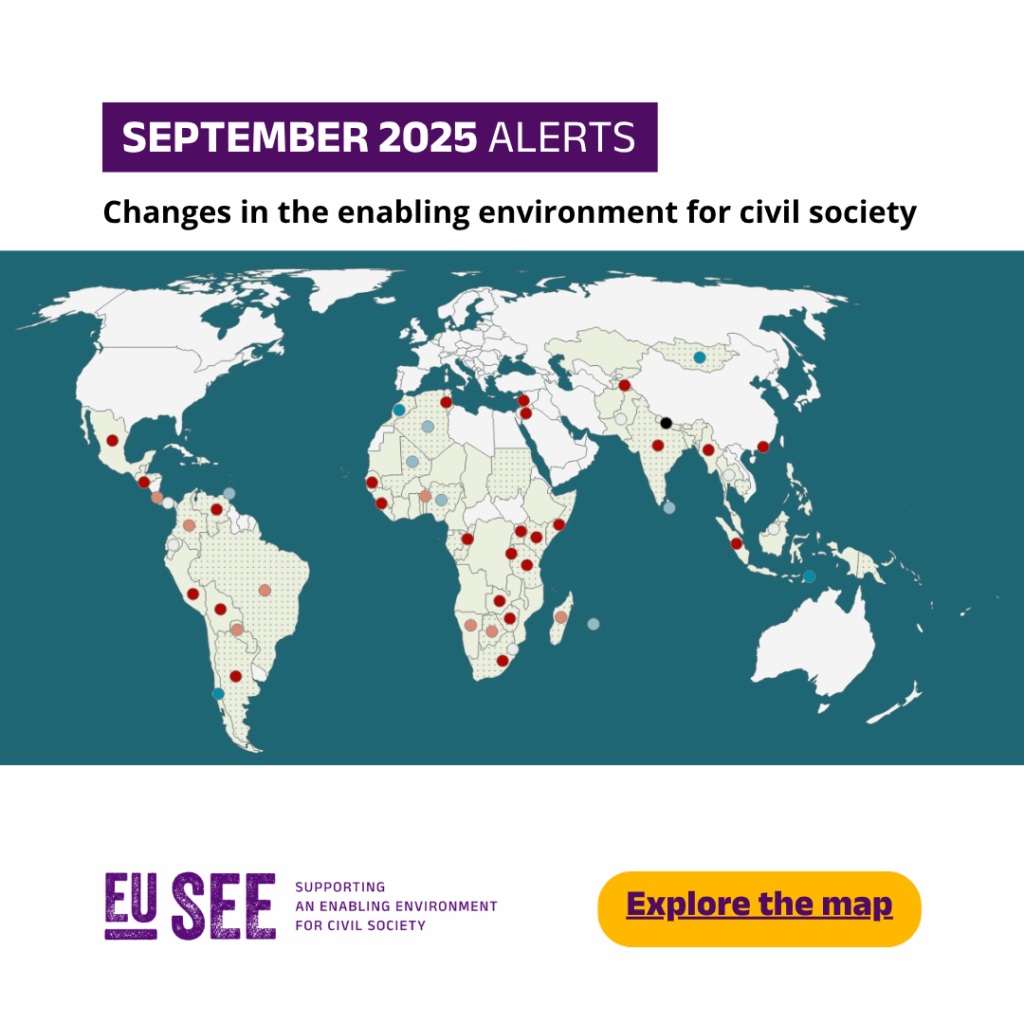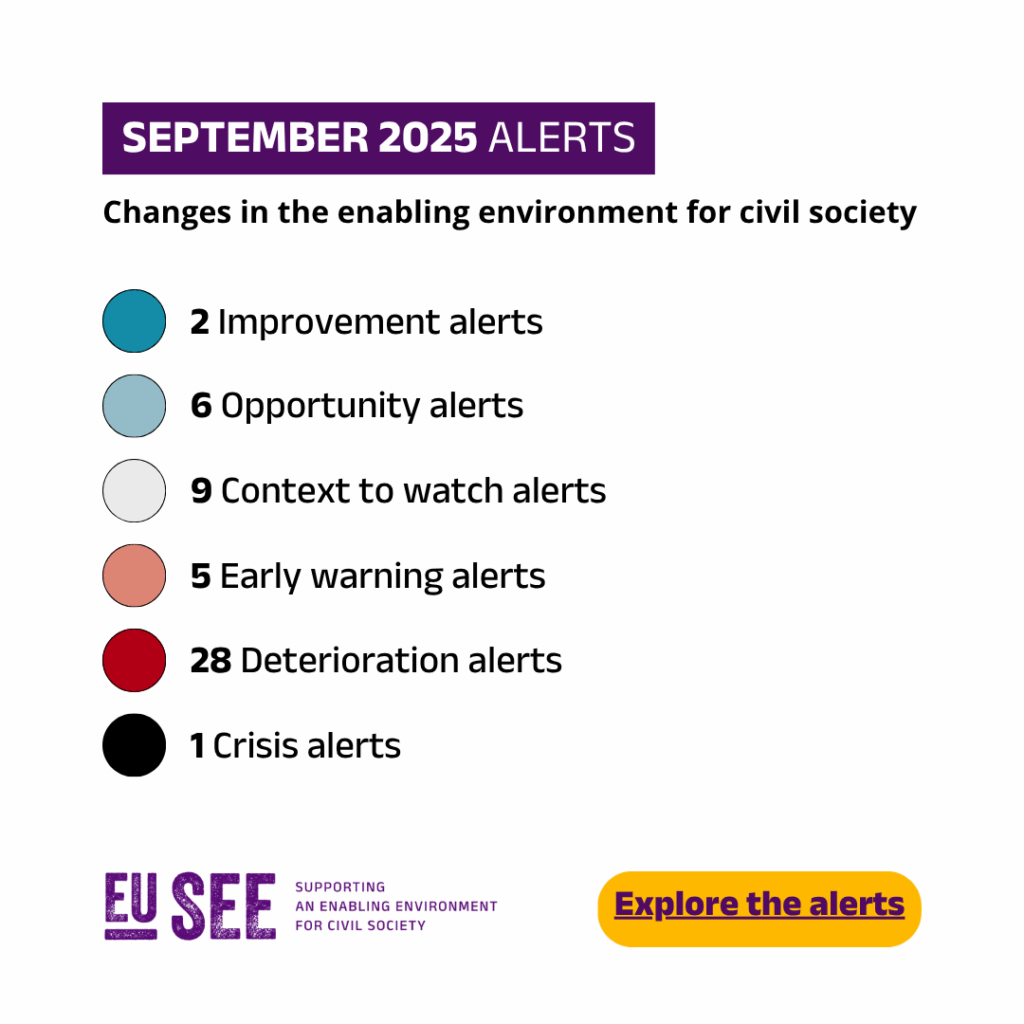51 alerts were published across the EU SEE programme in September, including one crisis alert related to the situation in Nepal. There were also a significant number of country focus reports published, providing a detailed assessment of the enabling environment for civil society in each respective country.
Emerging Trends
September was a month which saw large-scale anti-corruption protests in Nepal topple the Government. The month began in the wake of deadly protests in Indonesia at the end of August. Students and civil society groups, some under the One Piece flag banner of ‘Gen Z’ attempted to breach the Parliament building following outrage over political corruption, and excessive attempts by the Government to restrict civic space. Concordantly, in Nepal, it was a controversial draft Registration, Regulation and Management Bill, which sought to restrict NGO freedoms, that lit the initial fuse of anti-corruption protests that would eventually overthrow the Government. EU SEE have prepared a blow-by-blow account of the Nepal Gen-Z protests, with unique insights from our network on the ground. The Gen-Z global protest movement is one to keep an eye on, as Gen-Z related protests also emerged in Madagascar at the end of the month in response to the Government’s attempts to silence dissent and limit civic space.
Tax reforms continue to pose new challenges for NGOs, with India’s Income Tax Act imposing a 5% flat tax on anonymous donations. While these reforms modernise compliance and financial management, concerns remain that grassroots NGOs, particularly those reliant on small or anonymous contributions, may face funding strains and uneven treatment compared to large charitable trusts. In Zimbabwe, the Government is furthering its process of centralising control over NGOs and gatekeeping civil society by imposing flat fees for registration onto local and international NGOs. This disproportionately affects smaller, community-based groups and may lead to their reduced civic engagement, especially in rural and marginalised areas. In a plus for Trinidad & Tobago, their expected delisting from the EU Tax blacklist provides hope for further funding opportunities.
The battle for civic freedoms continues on its newest frontier; digital spaces, as the Government of Zimbabwe stated that WhatsApp group administrators would be held legally liable for any unverified corruption allegations made in chat groups. Civil society organizations have strongly criticized this, warning that this move will chill free expression, discourage whistleblowing, and erode digital civic space. In Zambia, the Communications Authority suspended the Online Content License of JamiiForum for 90 days in an attempt to limit civil society voices online ahead of the 29 October election. A sharp intensification of Myanmar’s digital crackdown unfolded in September, as the military regime deployed new surveillance tools and legal measures to further restrict civic space and monitor online activity. The digital space remains a key battleground, as evidenced by the attempted social media ban by the Nepali government, which was a key catalyst for the subsequent political reckoning.
The relationship between civil society and constitutional reform was spotlighted in September. Zambian CSOs were critical of the new Government’s attempt to accelerate reform processes without proper engagement, despite prior pledges to include civil society. Mali’s constitution faces a stern test, as the dissolution of political parties by the Government, under the banner of “rationalisation”, was referred to the Constitutional Court. Mali also saw a growth in opportunities for civil society, as the role of civil society organisations in peacebuilding was formally recognised in the nation’s Peace Charter, which was ratified by Parliament.
The targeting of journalists as a means for governments to restrict dissent is a consistent trend, with anti-corruption voice Mohalenyane Phakela arrested arbitrarily in Lesotho. A similarly arbitrary arrest of a journalist took place in Zambia, as Thandizo Banda was arrested and fined for photographing the moving vehicle of Electoral Commission Chairperson Mwangala Zaloumis. The incident has sparked concern among media and civil society actors, who have publicly criticized the arrest and the police’s narrative as part of a broader pattern of harassment and intimidation against journalists. These concerns were confirmed later in the month, as on 18 September 2025 in Chipata, Zambia, Prime TV reporter Christopher Bazilio Banda was assaulted by police officers.
September Country Focus Reports and Snapshots
- Haiti EE Baseline Snapshot (Click here for Francais)
- Kenya EE Baseline Snapshot
- Tanzania EE Baseline Snapshot
- Republic of Congo EE Baseline Snapshot (Click here for Francais)
- Mali EE Baseline Snapshot (Click here for Francais)
- Papua New Guinea EE Baseline Snapshot
- Venezuela EE Baseline Snapshot (Click here for Espanol)
- Gabon EE Baseline Snapshot (Click here for Francais)
- Peru Country Focus Report
- Myanmar Country Focus Report
- Pakistan Country Focus Report
- Thailand Country Focus Report
- Indonesia Country Focus Report
- Ecuador Country Focus Report (Click here for Espanol)
- Mexico Country Focus Report (Click here for Espanol)
- Bolivia Country Focus Report (in Espanol)
See all EU SEE alerts and subscribe for updates here: https://eusee.hivos.org/alerts


